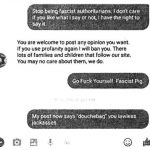
In July, Trump et al sued Twitter, Facebook, and YouTube in Florida for terminating his accounts. At the time, I laid out a 6-step prediction for how things would go: We’ve reached Step 2 in the YouTube case. Based on…
by guest blogger Marketa Trimble The location of a datacenter matters—the location of third-party datacenters affects companies’ (datacenter customers’) decisions whether to use the datacenters for colocation or other services. Part of any assessment of the suitability of a datacenter…

This case involves Tanner’s comments on the Arkansas State Police’s Facebook page. The court’s ruling raises interesting, but troubling, questions about any government actor’s ability to enable reader comments on social media. The Manually Deleted Comment One State Police post…

[Note: this blog post covers Rep. Nadler’s manager’s amendment for the SHOP SAFE Act, which I think will be the basis of a committee markup hearing tomorrow. If Congress were well-functioning, draft bills going into markup would be circulated a…

A 3-judge panel has issued its third opinion in Domen v. Vimeo, a lawsuit alleging that Vimeo committed unlawful discrimination by terminating his account. How does an appellate panel reach a third opinion in the same case? It issued its…

This is another entry in the genre of publicity rights cases against commercial databases vending information about people. Courts are struggling with how to analyze these cases, especially in the context of paywalled yearbook databases. This ruling turns into a…

Amyiah Cohoon is a high schooler in central Wisconsin. In March 2020, she contracted a respiratory illness. A COVID test came back negative, but the doctor told her it may be a false negative and told her to quarantine. She…

The Third Circuit ruled today that Section 230 doesn’t preempt publicity rights claims because they qualify as “intellectual property” claims. This ruling directly conflicts with the Ninth Circuit’s rule, which says that all state IP claims are preempted by Section…

It’s time for my annual roundup of my “summer” publications beyond my blogging. Once again, I did not teach last Spring. So here’s what I’ve done in 2021 since I finished my Fall 2020 teaching obligations: Internet Law: Cases &…
